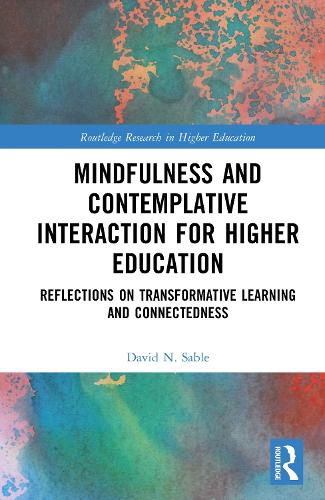Readings Newsletter
Become a Readings Member to make your shopping experience even easier.
Sign in or sign up for free!
You’re not far away from qualifying for FREE standard shipping within Australia
You’ve qualified for FREE standard shipping within Australia
The cart is loading…






This book situates mindfulness and contemplative interaction at the heart of transformative learning for a more sustainable and compassionate world.
Drawing on a mixed-methods study of a specific set of reflective learning activities introduced to undergraduates in Canada, the book highlights the importance of critical thinking and the necessity of the underlying affective dispositions to transformative learning. It argues that contemplative practices can play a central role in creating an unexpected sense of connectedness even among students who do not agree with each other, who may come from widely different backgrounds, and who may not speak English as a first language. These practices encourage students to improve their listening skills, suspend judgments, and explore multiple points of view without confirmation bias or rigidity. Mindfulness and contemplative interaction are further discussed in the context of the growing use of generative AI in higher education and the practical issues of student evaluation and feedback.
This forward-thinking volume will appeal to contemplative practice scholars in the field of higher education, as well as educators and researchers with interests in transformative learning, critical thinking, and applied mindfulness.
$9.00 standard shipping within Australia
FREE standard shipping within Australia for orders over $100.00
Express & International shipping calculated at checkout
Stock availability can be subject to change without notice. We recommend calling the shop or contacting our online team to check availability of low stock items. Please see our Shopping Online page for more details.
This book situates mindfulness and contemplative interaction at the heart of transformative learning for a more sustainable and compassionate world.
Drawing on a mixed-methods study of a specific set of reflective learning activities introduced to undergraduates in Canada, the book highlights the importance of critical thinking and the necessity of the underlying affective dispositions to transformative learning. It argues that contemplative practices can play a central role in creating an unexpected sense of connectedness even among students who do not agree with each other, who may come from widely different backgrounds, and who may not speak English as a first language. These practices encourage students to improve their listening skills, suspend judgments, and explore multiple points of view without confirmation bias or rigidity. Mindfulness and contemplative interaction are further discussed in the context of the growing use of generative AI in higher education and the practical issues of student evaluation and feedback.
This forward-thinking volume will appeal to contemplative practice scholars in the field of higher education, as well as educators and researchers with interests in transformative learning, critical thinking, and applied mindfulness.